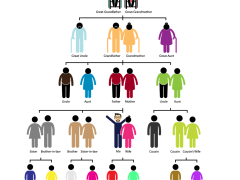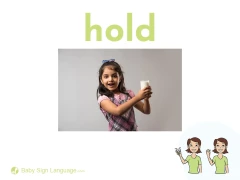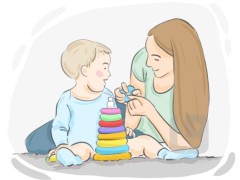noun [具体名词]角;嘴角,眼角;街角,拐角;角落,偏僻处;困境,窘境;角球;场角,场角的辅助人员 - The corner of a room, box, or similar space is the area inside it where its edges or walls meet.
verb [vt. 及物动词]将…逼入死角,使走投无路;硬要与某人说话;垄断;转弯,拐弯;囤积;相交成角 - If you corner a person or animal, you force them into a place they cannot escape from.
noun [具体名词]大块,一块(木料、石头等);(四面临街的)街段,街区;大楼,大厦;栋,座,幢;障碍物,阻碍(a block in the pipe / drain);(短时间的)思维停滞,思维中断;一组,一批,一叠;(连续的)一段时间;阻挡,拦截;积木;(古代斩首用的)垫头木;<美>一大片土地;(物体的)平面,纯色色块;滑轮,滑轮组;区块 - A block of apartments or offices is a large building containing them.
verb [vi. 不及物动词]阻塞,堵塞(道路、管道等);遮住(视线);封锁,挡住(去路);阻挠,阻止;阻截,拦截(对方的球);对…进行块操作;用模具使(帽等)成形 - To block a road, channel, or pipe means to put an object across it or in it so that nothing can pass through it or along it.
noun [专属名词]日期,日子;约会,幽会;约会对象;椰枣,海枣 - I've got a hot date tonight.
verb [vi. 不及物动词]注明日期;确定年代;<美>谈恋爱,约会;过时,不流行;使显老 - The official launch date is in May.
noun [具体名词]停车,泊车;停车场,停车位 - Parking is space for parking a vehicle in.
verb [vi. 不及物动词]存放,寄存;停车,泊车;坐下(或站着)(park 的现在分词形式) - There is ample car parking off site.
noun [抽象名词]肮脏,杂乱;不整洁或邋遢的人(或物);掉落的东西,溅出的东西;(动物的)粪便;困境,混乱局面;处于困境的人 - A mess is something liquid or sticky that has been accidentally dropped on something. (
verb [vi. 不及物动词]弄脏,弄乱;玩弄;随地便溺;在军人食堂就餐 - He was messed up pretty bad by the other guy.
口语中a mess 用来指“困境,窘境,一团糟”等含义
- What a mess! 真是糟糕透了!
- You are a mess! 你真邋遢
- The man/woman is a mess.
make a mess of sth. 把……搅得乱七八糟
- He made a mess of my job. 他把我的工作搅得一团糟
- Make some jam if you want to, but don’t make a mess in the kitchen.
noun [专属名词]嫂子;弟媳;妯娌 - At first, this made my sister-in-law "feel better".
adjective [原级]高兴的,满意的;高兴,乐于(做某事);洋洋自得的,自满的 - Felicity seemed pleased at the suggestion.
verb [vt. 及物动词](使)开心,(使)满意;想,选择,喜欢;请便,随你的便(please 的过去式和过去分词形式) - "Sophie was glad to see you," he said, pleased with himself again for having remembered her name.
noun [具体名词]保留,保护;(房间,座位等的)预订;(美国印第安人的)居留地,保留地;(野生动物)保护区;<法律>(财产转让的)权益保留;圣餐保留(指弥撒完毕后部分圣餐留给病人或作为礼拜之用);存疑,保留;(罗马天主教高级圣职人员的)赦罪权的保留;(教皇的)任命权保留 - We can hold your reservation for three days.
verb [vi. 不及物动词](用手、手臂等)抓住,托住,夹住;抱住,捂住,按住(受伤的身体部位等);拥抱;使保持(在某位置);支撑…的重量;容纳,包含;存放,盛放,装;监禁,拘留;防守,保卫,(用武力)占据;(好形势)保持不变,持续;吸引住(注意力),保持(兴趣);(使)保持(价值或水平);保存,保留(以备后用);拥有,持有;担任,任职 - Does your offer still hold?
noun [专属名词]拿,抓,握;(摔跤等运动中的)擒拿技法;影响,左右力,控制;(供手攀、脚踏的)支撑点,支撑物;底舱,货舱;预定;坚持,继续拥有;理解 - They hold differing views.
hold 习惯用被动
- The Olympic games will be held in China in 2008. (two thousand eight)
- A festival is held at Edinburgh every year. 节日庆典每年在爱丁堡举行一次.
- We are going to hold a meeting tomorrow to discuss the subject.明天我们准备开一次会来讨论这个议题.
- The next conference will be held in Geneva. 下次会议将在日内瓦举行.
| vt. 拿着,抓住,抱住 |
|
|---|---|
| 容纳,装得下,包含 |
|
| 举行,进行(会议、会谈等);庆祝(节日);纪念 | have a meeting = hold a meeting 召开会议 |
noun [专属名词]临时替人看小孩者 - Television has become a baby-sitter, an introducer of conversations, the major transmitter of culture, a keeper of tradition.
verb [vt. 及物动词]离开(某人或某处);留下;丢下;剩下;遗忘 - He would not be allowed to leave the country.
A.离开
- He has left Beijing.
- When will you leave the hotel?
B.遗留、落
- Please leave the door open. 留着门儿。
- I left my bag on the train. 我把包落在火车上了。










